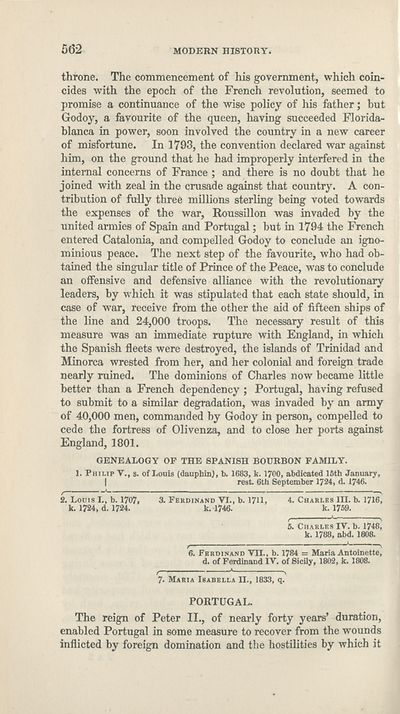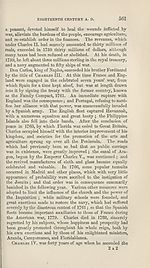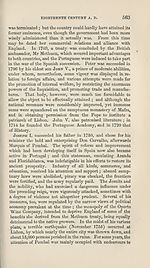Download files
Complete book:
Individual page:
Thumbnail gallery: Grid view | List view

562
MODERN HISTORY.
throne. The commencement of his government, which coin¬
cides with the epoch of the French revolution, seemed to
promise a continuance of the wise policy of his father; but
Godoy, a favourite of the queen, having succeeded Florida-
blanca in power, soon involved the country in a new career
of misfortune. In 1793, the convention declared war against
him, on the ground that he had improperly interfered in the
internal concerns of France ; and there is no doubt that he
joined with zeal in the crusade against that country. A con¬
tribution of fully three millions sterling being voted towards
the expenses of the war, Roussillon was invaded by the
united armies of Spain and Portugal; but in 1794 the French
entered Catalonia, and compelled Godoy to conclude an igno¬
minious peace. The next step of the favourite, who had ob¬
tained the singular title of Prince of the Peace, was to conclude
an offensive and defensive alliance with the revolutionary
leaders, by which it was stipulated that each state should, in
case of war, receive from the other the aid of fifteen ships of
the line and 24,000 troops. The necessary result of this
measure was an immediate rupture with England, in which
the Spanish fleets were destroyed, the islands of Trinidad and
Minorca wrested from her, and her colonial and foreign trade
nearly ruined. The dominions of Charles now became little
better than a French dependency ; Portugal, having refused
to submit to a similar degradation, was invaded by an army
of 40,000 men, commanded by Godoy in person, compelled to
cede the fortress of Olivenza, and to close her ports against
England, 1801.
b. 1711, 4.
s-
PORTUGAL.
The reign of Peter II., of nearly forty years’ duration,
enabled Portugal in some measure to recover from the wounds
inflicted by foreign domination and the hostilities by which it
MODERN HISTORY.
throne. The commencement of his government, which coin¬
cides with the epoch of the French revolution, seemed to
promise a continuance of the wise policy of his father; but
Godoy, a favourite of the queen, having succeeded Florida-
blanca in power, soon involved the country in a new career
of misfortune. In 1793, the convention declared war against
him, on the ground that he had improperly interfered in the
internal concerns of France ; and there is no doubt that he
joined with zeal in the crusade against that country. A con¬
tribution of fully three millions sterling being voted towards
the expenses of the war, Roussillon was invaded by the
united armies of Spain and Portugal; but in 1794 the French
entered Catalonia, and compelled Godoy to conclude an igno¬
minious peace. The next step of the favourite, who had ob¬
tained the singular title of Prince of the Peace, was to conclude
an offensive and defensive alliance with the revolutionary
leaders, by which it was stipulated that each state should, in
case of war, receive from the other the aid of fifteen ships of
the line and 24,000 troops. The necessary result of this
measure was an immediate rupture with England, in which
the Spanish fleets were destroyed, the islands of Trinidad and
Minorca wrested from her, and her colonial and foreign trade
nearly ruined. The dominions of Charles now became little
better than a French dependency ; Portugal, having refused
to submit to a similar degradation, was invaded by an army
of 40,000 men, commanded by Godoy in person, compelled to
cede the fortress of Olivenza, and to close her ports against
England, 1801.
b. 1711, 4.
s-
PORTUGAL.
The reign of Peter II., of nearly forty years’ duration,
enabled Portugal in some measure to recover from the wounds
inflicted by foreign domination and the hostilities by which it
Set display mode to:
![]() Universal Viewer |
Universal Viewer | ![]() Mirador |
Large image | Transcription
Mirador |
Large image | Transcription
| Antiquarian books of Scotland > Education > Elements of universal history on a new and systematic plan > (582) |
|---|
| Permanent URL | https://digital.nls.uk/127587124 |
|---|
| Description | Thousands of printed books from the Antiquarian Books of Scotland collection which dates from 1641 to the 1980s. The collection consists of 14,800 books which were published in Scotland or have a Scottish connection, e.g. through the author, printer or owner. Subjects covered include sport, education, diseases, adventure, occupations, Jacobites, politics and religion. Among the 29 languages represented are English, Gaelic, Italian, French, Russian and Swedish. |
|---|

